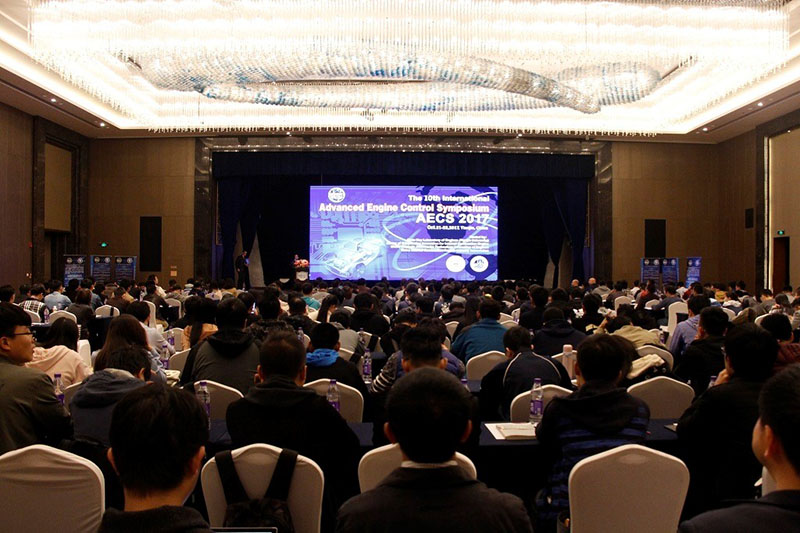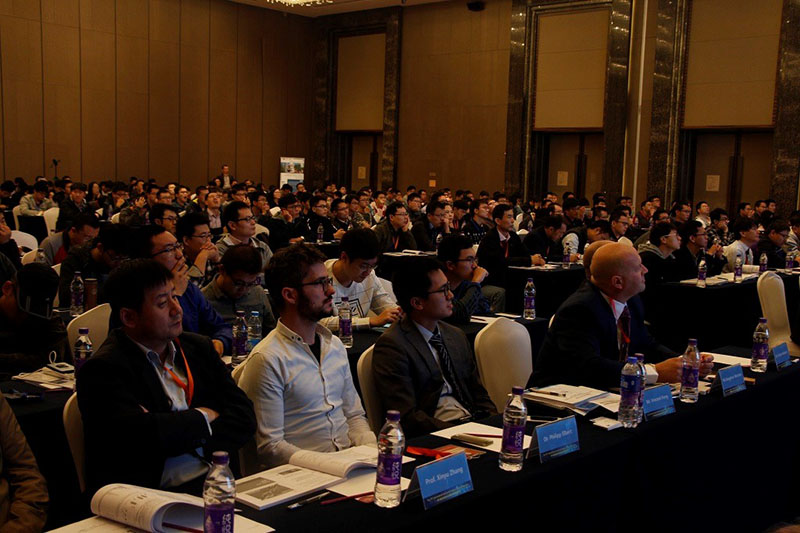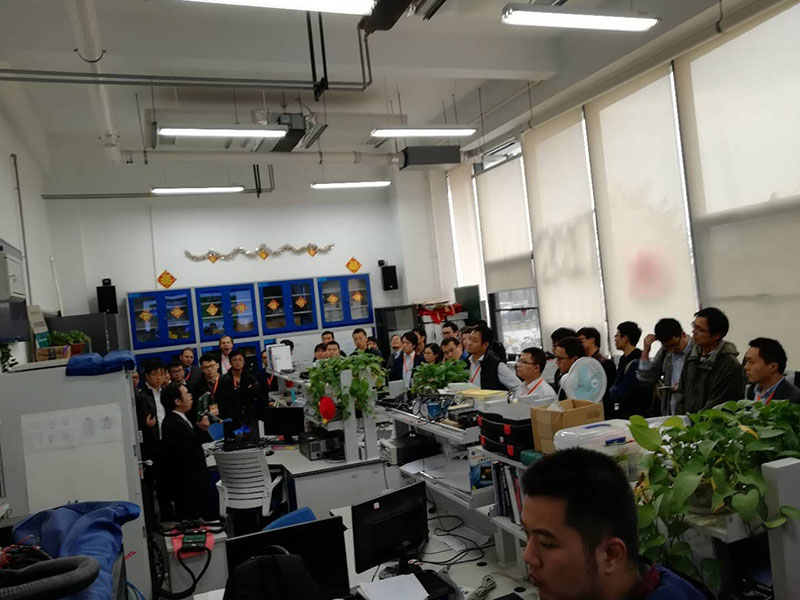
On October 21 and 22, 2017, the 10th International Advanced Engine Control Symposium (AECS2017) was held in Tianjin. Eighteen experts from well-known colleges and universities and research institutions of China, Germany, the United States, Japan, Britain, Sweden, Switzerland, Austria and other countries exchanged the latest research results concerning hot topics in the field of engine control, including the calibration and control of real driving emissions (RDE), virtual calibration, combustion models and model-based control, advanced air device control, post-processing control, and AI applications. Over 310 representatives from well-known enterprises and colleges and universities at home and abroad attended this event.
The opening ceremony was hosted by Professor Xie Hui, Deputy Director of the State Key Laboratory of Engines at TJU and Chair of the symposium. Shu Gequn, Executive Vice Party Secretary of TJU delivered a welcoming address on behalf of the organizers. Professor Per Tunestal of Lund University and Chair of the International Federation of Automatic Control (IFAC AAC) presented the aims of AECS and reviewed the previous symposiums.

During the two-day symposium, the attendees focused on the current theme of engine research: high efficiency, less pollution, electrification and intellectualization. Yang Liuhanzi of the International Council on Clean Transportation (ICCT) released the detailed research data on the car that led to the Volkswagen Scandal in America and the outcome of related research carried out in Germany and China. Due to the huge discrepancy between RDE and emissions tested in laboratories, both academic and industrial circles have paid greater attention to the control and calibration of RDE.
Experts from Loughborough University of Britain, Argonne National Laboratory of America, AVL, Ricardo and FEV tried to come up with a resolution to RDE calibration from the perspective of calibrating methodology, emission data analysis, technological measures of calibration and the platform. Dr. Thomas Steffen of Loughborough University suggested that the complicated calibrating problem could be solved through digital engineering with the data acquired from vehicle driving. Mr. Vaughan Morton of AVL, Dr. Stefan Niedderer of FEV and Vincent Feng of Ricardo separately introduced advanced calibrating platforms, virtual calibrating methodology, and the calibrating measures for testing RDE. They all emphasized the importance of model-based engineering.
With reference to modelling and controlling of high-efficiency engines, Professor Per Tunestal of Lund University introduced a novel combustion controlling model for a high-efficiency cleansing engine. Professor George Zhu of Michigan State University came up with a control object-oriented combustion model. Dr. Yiqun Huang of ARCM explained the function of multi-mode combustion control in advanced high-efficiency engines. Professor Lars Eriksson of Linkoping University demonstrated a set of diesel engine models. Professor Yudai Yamasaki of The University of Tokyo described the latest progress of control-oriented combustion models and devices related to model control. Professor Tielong Shen of Sophia University explained an online learning method of a combustion controlling model.
With reference to the electrification and intellectualization of engines and powertrains, Professor Xie Hui explained in detail an electrified air device controlling system and its potential for energy saving. Dr. Patrick Schrangel of Johannes Kepler University introduced a comprehensive design resolution for a virtual sensor. Dr. Philipp Elbert of Zurich Polytechnic University shared with others the idea of CO2 optimal control in a heavy duty HEV car. Dr. Jin Jiangshan of the Shanghai Marine Diesel Engine Research Institute proposed a neural network-based malfunction diagnosing method of an electronically controlled fuel system. Associate Professor Zhang Xinyu of Tsinghua University described the development of self-driving technology and its requirements for engine control. Professor Patrick Leteinturier, chief scientist of Infineon expected that electrification and intellectualization will promote the development of powertrains.

During the symposium, representatives paid a visit to the State Key Laboratory of Engines at the Peiyang Park Campus of TJU and had in-depth exchanges with members of the engine controlling research group. Professor Xie showed a digital model of HCCI gasoline engine for algorithm testing of combustion control, together with the benchmark resolution. He called on those interested in it to explore its algorithm, so as to promote the industrial application of high-efficiency and clean HCCI combustion. The Organizing Committee of AECS held a conference on October 22 to formulate future plans for AECS, in which they discussed a new mechanism to carry out international cooperation.

The highlights of cutting-edge research and the newest controlling technologies were shown in this symposium, which represented the developing trend of engine control technology, enabling technicians and postgraduates to gain deeper insights into this field. Also, valuable exchanges between the academic and industrial circles were promoted.
By:Wu Jingjing, Wang Kai
Editors: Sun Xiaofang and Ross Colquhoun






